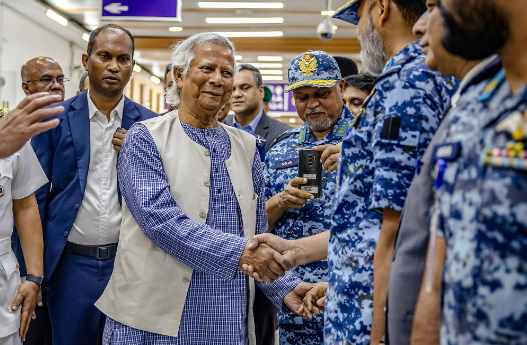
封面故事:来自彭博推送,诺贝尔得主 Muhammad Yunus 抵达达卡(Dhaka, 孟加拉国首都及第一大城市)。
注意,笔者会借助百度翻译完成这些翻译,总的来说,目前是意译为主。
单词
ransack 奔跑着带着麻袋 —— 洗劫
opulent palace 华丽的宫殿。opu- 透明的,透光的
desecrating 亵渎
cart away 运走
lingerie 内衣
torch 烧毁
police precincts and the homes of ministers 警察辖区和总理住所
vandalize 破坏
steamrolled 完胜
grenade attack 手榴弹袭击
cut out for him 为他量身定做
porous 多孔的
译文
孟加拉国迎来一位新领导人,在人们开咱不支持现有政府的游行之后,临时上任(temporarily installed)。现在,Kai Schultz 尝试用一些发生的时间和不确定性,来获取人们注意。注意,该国的经济似乎还能左右美国大选。
暴力与动荡(violent and tumultuous)的一周之后,政府陷入大量抗议活动,领导人乘直升机试图逃离该国(fled the country),以及未来会更黑暗,对于这个全世界最重要的新兴市场而言。
孟加拉国,人口 1.7 亿,沸腾了。数周以来,几千名示威者表达了他们的愤怒,他们走上首都达卡街头,向总理 Sheikh Hasina 表达愤怒,与维护治安人员产生好几起流血冲突。作为亚洲任期时间最长的 Leader,Hasina 是被广泛信任的,他还使得该国经济反转。但是,随着她对权力抓得得越来越紧(grip on power tightened),Hasina 及其团队转向权威主义(veered toward authorianism )。她的评论 写到,将反对者关进监狱,以及驱散记者,和一些组织。约 400 人丧生在这场暴乱中。
Hasina 周一辞职了,结束了其 15 年的连任,但是达卡街头仍然在燃烧。抗议者洗劫了她华丽的办公地点(宫殿,opulent palace),运走家具(cart away),亵渎她父亲的照片,孟加拉国首任总统,甚至与她的内衣合影。烧毁警察辖区和总理住所,破坏少数印度教的庙宇,穿越议会办公地。在 Hasina 进入印度,议会很快解散了,但是她在印度明确了其下一步动作。
对很多人来说,对孟加拉国是非常可怕的新闻。Hasina 支持者说到,她犯错误,但是确实有竞争力的行政长官 —— 带领几百万人脱离贫困,通过服装出口的方式,非常专业地维护好与印度、中国外交关系,保证伊斯兰人们在该国生活,但是原理穆斯林思想。他们认为,她铁腕政治,但是孟加拉的弱者领导人完胜了。你看看 Hasina 传记吧,几乎整家人被谋杀,1970 年左右。以及她也逃脱了大量暗杀活动,包括有一次集会时候,受到手榴弹攻击。
孟加拉国下一步并不确定。很多抗议者是学生,Hasina 方案的结局,是开启全新的开始,以及提供机会重建该国,通过更加自由和公平的方式。军事力量已经介入,来重建秩序。孟加拉主要反对党,正在启动新一轮选举,预计未来几个月开展。
周二的时候,凭借环节贫困而获得诺贝尔奖的 Muhammad Yunus,被任命为临时孟加拉国的领导人。他会为自己量身定做工作内容,该国经济最近放缓了,刺激了国际货币基金组织介入进行救援。有传言,孟加拉国央行行长会辞职。法院也不开。印度,长期以来是 Hasina 同盟,没有法律限制可能使得孟加拉国产生宗教基本主义(religious fundamentalism)。以及会波及到脆弱的边防(porous border)。
最近去了一趟达卡,我花了点时间和 Yunus 约谈,在其住所和办公室。他几乎没有兴趣进入政治领域,更关注其社会商业,该业务涉及微金融、反贫困。“我并非政客”他告诉我,“这也是我不会干的事” —— 几个月变了好多啊!
原文
Bangladesh has a new leader, temporarily installed after weeks of demonstrations against the elected government. Today, Kai Schultz catches us up on what’s happened and the uncertainty to come. Plus: The economic realities in the states likely to decide the US presidential election. If this email was forwarded to you, click here to sign up.
In a violent and tumultuous week for Bangladesh, the government fell amid enormous protests, its leader fled the country in a helicopter, and the future became a whole lot darker for one of the world’s most important emerging markets.
Bangladesh, home to 170 million people, is on the boil. For weeks, thousands of demonstrators have vented their anger at Prime Minister Sheikh Hasina on the streets of Dhaka, the capital, leading to bloody clashes with security personnel. One of Asia’s longest-serving leaders, Hasina was widely credited with turning around the nation’s economic fortunes. But as her grip on power tightened, Hasina and her government veered toward authoritarianism, her critics say, jailing opponents and cracking down brutally on journalists and civil society. About 400 people were killed during recent protests.
After Hasina resigned on Monday, ending 15 years of consecutive rule, Dhaka’s streets kept burning. Protesters ransacked her opulent palace, carting away furniture, desecrating photographs of her father (Bangladesh’s first president) and even posing for pictures with her lingerie. They torched police precincts and the homes of ministers, vandalized temples of minority Hindus, and ran through the halls of Parliament, which was dissolved shortly after Hasina left for India, where she’s figuring out her next step.
To many, this is all terrible news for Bangladesh. Hasina’s supporters say she made mistakes but was a highly competent administrator—pulling millions out of poverty through garment exports, expertly balancing ties with India and China and keeping Islamists at bay in one of the world’s few Muslim democracies. She ruled with an iron fist, they argue, because weak leaders are steamrolled in Bangladesh. Just look at Hasina’s biography. Almost her entire family was murdered in a coup in the 1970s, and she’s survived numerous assassination attempts, including a deadly grenade attack at one of her rallies.
Bangladesh’s next steps are uncertain. For the protesters, many of them students, the end of Hasina’s regime marks a fresh start and a chance to rebuild their country in a freer and fairer way. The military has intervened to restore some order. Bangladesh’s main opposition party is gearing up for fresh elections that are supposed to be held within a few months.
On Tuesday, the economist Muhammad Yunus, who won a Nobel Peace Prize for his work alleviating poverty, was appointed the temporary head of Bangladesh. He’ll have his work cut out for him. The country’s growth has lately slowed, prompting the International Monetary Fund to step in with bailout funds. There are rumors the governor of Bangladesh’s central bank may resign. Courts aren’t functioning. India—a longtime ally of Hasina’s—worries that lawlessness will breed religious fundamentalism in Bangladesh, and could spill across a porous border.
During a recent trip to Dhaka, I spent several hours with Yunus at his home and office. He expressed little interest in entering politics, preferring to focus on his social businesses related to microfinance and fighting poverty. “I’m not a politician,” he told me. “This is something I will never do.” What a difference a few months makes.
Flashback, from Businessweek in July: Nobel Peace Prize Winner Muhammad Yunus Risks Life in a Bangladesh Jail
原文链接
长按/扫码,有您的支持,我们会更加努力!


|
